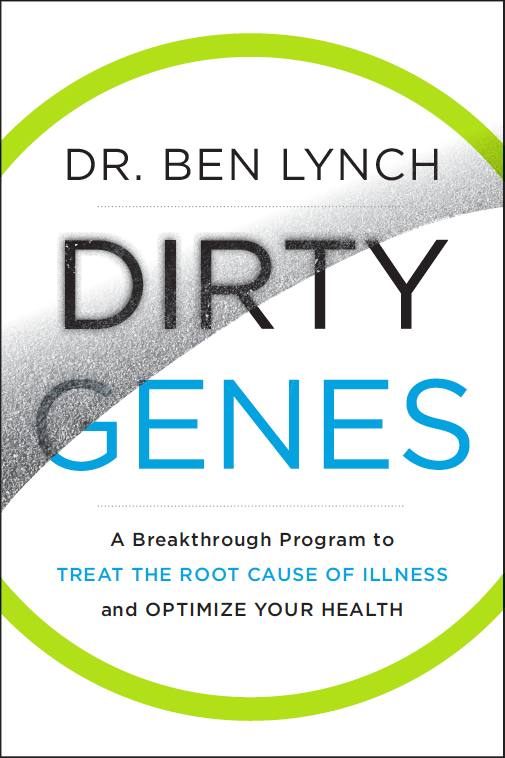384 pages, HarperOne (Jan. 30 2018)
“Start with the basics” is a notion easily neglected in an era over-burdened with technology of dubious usefulness. Dr. Ben Lynch emphasizes this essential tenet of integrative medicine in his newly released self-help book, Dirty Genes. The book, aimed primarily at the lay-person but equally useful to practitioners hoping to gain a basic understanding of the complex and quickly-evolving field of nutrigenomics, reminds us all that nothing replaces a healthy, balanced lifestyle.
Nutrigenomics is a newly acknowledged field in medicine attempting to describe the connection between an individual’s unique genetic data and nutritional biochemistry. With hopes of making personalized, precision medicine a true reality as we progress through the 21st century, numerous health/tech companies promise improved clinical results with the implementation of strategies suggested by the algorithmic processing of an individual’s raw genetic material (provided by such companies as 23andMe, Ancestry.com, Genos, Family Tree DNA, Complete Genomics, etc.) or via the interpretation of a number of single nucleotide polymorphisms (SNPs, pronounced “SNIPS”) identified via in-house laboratories. Modulation of enzymatic activity via the addition or removal of substrates and cofactors is typically suggested as the route of choice, and is not unlike a traditional approach taken by keen orthomolecular practitioners, perhaps with the hope that individual nuance may be appreciated more efficiently. Reliability of genetic data is something to keep in mind. Though central to the validity of strategies aimed at improving human metabolism via SNP modulation, reproducibility studies on single samples are lacking in peer-reviewed literature.
A well-seasoned naturopathic physician based outside of Seattle, Washington, Ben Lynch focuses primarily on integrating data as it relates to the expression of genetic material. In a field that expands on a daily basis, Lynch has secured his position as an integrative nutrigenomics expert. Offering numerous online training programs and a yearly conference through his medical organization – Seeking Health Education Institute (SHEI), Lynch has become a valuable source of knowledge for those seeking to expand their understanding of nutrigenomics within an integrative medical framework.
True to his training, Lynch makes no promise that addressing “Dirty Genes” or SNPs alone, will generate improved patient outcomes. Instead, Lynch suggests every patient despite unique SNPs, follow a two-week life style intervention designed to improve resiliency, essentially decreasing environmental factors that may be contributing to the expression of “Dirty Genes” or SNPs, prior to implementing strategies aimed specifically at normalizing the effect these genetic variants. Lynch delves into the epigenetic influence on genetic susceptibility, and the fact that the human body contains many back-up systems to negate the influence of SNPs. No one SNP (described in his book at least) is a genetic determinant of health. In fact, Lynch suggests that while useful, genetic tests aren’t always necessary when identifying likely variants affecting metabolism and an individual’s experience of health. Included in Dirty Genes is a questionnaire aimed at identifying likely SNPs based on patient symptoms. Lynch describes the normal and altered clinical picture associated with 7 common genetic variants, including the well-known MTHFR gene involved in folate metabolism and methylation, in addition to SNPs associated with DOA, COMT, MAOA, GST/GPX, NOS3 and PEMT. The book also includes diet and lifestyle recommendations, recipe recommendations for those likely suffering from the effects of specific SNPs and of course, nutrient recommendations to combat the effects of SNPs still acting up after diet and lifestyle have been accounted for.
Dirty Genes is not an exhaustive resource for understanding the influences of nutrigenomics on an individual’s nutritional biochemistry. Instead, it is an introduction to SNPs with the most established data, and the concept that we as clinicians can only influence so much with nutritional intervention alone. Epigenetic factors are emphasized as essential when attempting to optimize an individual’s health. Mental, emotional and physical disturbances, in addition to environmental contamination and chemical body burden are recognized as fundamental contributors to disease. Lynch does an excellent job of synthesizing what we do know when it comes to genetic variants, but also reminds us that this is only one side of the story.
Dirty Genes is a useful resource describing safe, evidenced-based interventions in nutrigenomics. Does everyone need this book to effectively treat patients? Not necessarily, but having this book on your shelf will very likely improve outcomes for patients otherwise resistant to standard intervention, and provides an excellent foundation for those interesting in pursuing specialty training in the field. Consider additional training via drbenlynch.com, or similar nutrigenomic institutes like Genomind, SNPed, or the Institute for Functional Medicine.


